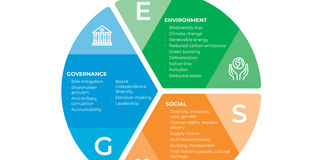Why ESG strategies are key to sustainable business practices

What you need to know:
- For most companies today, it’s more important than ever to understand the impact of their business and its contribution towards ESG matters – whether they make a negative, neutral, or positive contribution in society
Recently, KPMG in Tanzania, together with the American Chamber of Commerce in Tanzania hosted an event with the business community to discuss the global and local trends, challenges, and opportunities in the field of Environmental, Sustainability, and Governance (ESG) Strategy and Reporting for businesses. The event brought together companies from the telecommunication, manufacturing, logistics, and financial services sectors to discuss the topic.
For most companies today, it’s more important than ever to understand the impact of their business and its contribution towards ESG matters – whether they make a negative, neutral, or positive contribution in society.
The extent of their impact could have a long-term consequence with regards to access to finance and investment, as well as reputational or regulatory risk.
This is particularly relevant, especially in Tanzania and Africa, where we face unique challenges relating to our natural environment, social inequality, and governance that risk holding back potential for our countries to achieve inclusive and sustainable growth.
The world is evolving. The growing climate crisis is driving increasing demands by national governments and pressures on businesses to implement sustainable initiatives.
Indeed, we’re now at a stage of international cooperation through annual events, such as COP27, where more emphasis is on moving from discussion of ESG strategy from “intent” to “implementation”.
Business leaders are considering ESG initiatives holistically to help fulfil their purpose, achieve their goals, and position themselves for future growth and for attracting new kinds of ‘green’ investment and finance.
Environmental factors are critical especially in Africa due to the continent’s high vulnerability to climate change. Reported extreme weather events such as floods, droughts in the horn of Africa and storms in parts of Mozambique are becoming more frequent and severe leading to significant economic losses and suffering to the smallholder farmers that are critical participants of supply and value chains for large businesses in Tanzania and globally.
The Dar es Salaam Stock Exchange (DSE) has taken the positive step of beginning to sensitise listed companies to sustainability and the ESG agenda by requiring them to begin reporting on how they are addressing sustainability through their own strategic corporate plans and actions.
Essentially, DSE has signalled that good corporate governance means designing and implementing strategies that are socially responsible and pursue practices of high standards in corporate governance through more transparent public disclosure and reporting on topics like their firm and its impact on sustainability and the environment.
As Tanzania’s ecosystem opens for even more business and investments, there’s even more need for companies that are interacting with global firms to demonstrate that they too are delivering products and services meet certain environmental and sustainability standards. By doing so, companies can provide assurances to investors, international lenders, buyers and indeed their own local stakeholders that they are effectively moving in the direction of improving their goods, products, and services.
Currently, we see that most organisations responding to the ESG challenge and designing and implementing new ESG strategies are often triggered by regulatory pressures – whether due to new regulations in Tanzania or because of new regulations in other territories that their multi-national or supply chain in Tanzania, fall under the governance of. But implementing a new ESG strategy and reporting voluntarily can also enhance the reputation and access to finance and investment of organisations. It can also stand them in a better position to foresee or respond to an ESG crisis that might affect their brand, reputation or even their bottom line in the local market.
Both investors and customers are increasingly looking for companies that are committed to sustainability and responsible business practices. By incorporating ESG reporting into their operations and adopting a strategy to make improvements against some selected targets over time, Tanzanian-centred SMEs and Large Businesses can position themselves to attract investments and funding from a wide range of investors.
Recognising the increasing mandatory and voluntary demand for ESG services, KPMG has launched a multi-year investment programme to help drive our own experience and solutions to support multi-national and local organisations with handling the risks and opportunities of ESG.
In fact, KPMG has also made significant investments in putting ESG at the heart of our organisation through our own ESG strategy and actions – we’re also focused on turning intent to implementation.
What are some practical actions that SMEs, large businesses and corporates should be considering when it comes to ESG?
Manufacturing organisations can use their market position to develop products that source from and promote sustainable agriculture practices, use a mix of renewable energy in their production cycles and support social programmes that improve access to better livelihood in their community or the communities of their value chains, such as education.
In general, there is a need for manufacturing organisations to considering driving their existing or new business models, products, and services towards addressing climate change by minimising carbon emissions as they grow – especially if we in Tanzania wants to meet our National Determined Contribution (NDC) target in the Paris Agreement.
Practically, this might mean manufacturing firms consider conducting a climate risk evaluation of their operations, or designing decarbonisation pathways to net zero, or designing a new business venture that is eligible for accessing low carbon financing and investment.
The financial services and insurance sector can support organisations through designing ESG services and products focused on asset management, insurance, banking, and private and public financing. For example, their experts should work with governments, regulators, central banks, international organizations, and development banks to build ESG rules and structures which assist in the offering of public finance to ‘green’ projects including the incorporation of private finance alongside the public.





